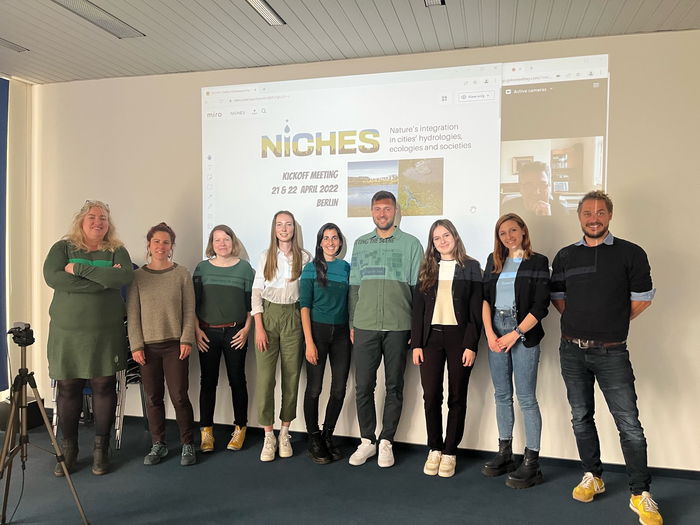Reviewed by Alex SmithMay 10 2022
As an impact of climate change-induced heavy rainfall events, increased stormwater runoff tends to pose a threat to urban aquatic biodiversity.
 NICHES kick-off meeting in April 2022. Image Credit: NICHES Project.
NICHES kick-off meeting in April 2022. Image Credit: NICHES Project.
In particular, integrated drainage systems that tend to transport urban water, stormwater and wastewater can flood following heavy rainfall, thereby causing wastewater leakage and contaminated runoff directly into rivers, streams, or other water bodies in the vicinity.
The NICHES project (“Nature’s integration into cities’ hydrologies, ecologies, and societies”) identifies this danger and hopes to highlight the ability of nature-based solutions (NBS) to reduce the negative effects of such integrated sewage overflow events on society and the surrounding.
NBS, like sustainable urban drainage systems, riverbank restoration, and the regeneration of urban green belts, can serve as an alternative to the excessive renewal of wastewater systems and also as a supplementary element to the present stormwater management systems.
In spite of this potential, the usage of NBS for urban water management has been restricted. This is in part due to the lack of proof, methods, and targeted guidance available to decision-makers, practitioners, and other appropriate groups. The goal of NICHES is to bridge this gap by specifying a holistic framework for comprehending the ecological, social, and technical views of employing restorative NBS for urban runoff reduction and the consequent advantages for aquatic systems.
With the help of its five global cities as co-design arenas, the project will also aid the development of suggestions for combining NBS in urban policies.
The project commenced with a consortium meeting on 21st–22nd April 2022, in Berlin, Germany. It was conducted by the Ecologic Institute, the first meeting welcomed 11 experts from the seven partner institutions.
Also, these partners represent the cities that the project’s research will be focusing on, including Rotterdam (Netherlands), Barcelona (Spain), Berlin (Germany), Boston (USA), and Sheffield (UK).
Current combined sewage systems cannot cope with the increasing impacts of climate change. Resultant pollution from sewage overflow events introduce harmful bacteria, pathogens, and solid waste into water bodies and threaten aquatic biodiversity. A shift towards the use of nature-based solutions to complement traditional systems is needed.
McKenna Davis, Project Coordinator, Ecologic Institute
With the help of the research and analysis of NICHES findings in these cities, the project will advance scientific knowledge regarding restorative NBS and illustrate its mitigation ability for handling integrated sewage overflow.
Enhancements in terms of citizen engagement, spatial planning, maintenance, and the integration of water governance structures will aid ecological enhancements and generate extensive societal advantages.
This study was financially supported through the 2020-2021 Biodiversa and Water JPI joint call for research proposals, under the BiodivRestore ERA-Net COFUND program, and with the funding organizations: German Federal Ministry of Education and Research; Agencia Estatal de Investigaction; Ministry of Agriculture, Nature and Food Quality of the Netherlands.